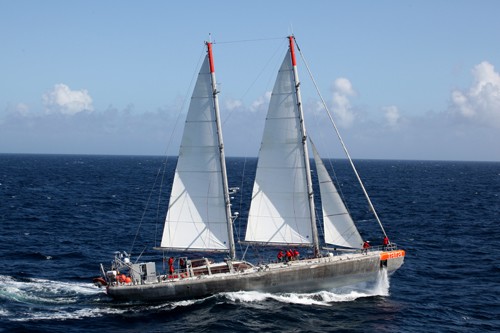Tara Oceans Expedition - as ambitious as Charles Darwin
by Sail-World Cruising on 11 Jan 2010

Tara under sail SW
80,000 nautical miles, 60 ports of call, a three-year plan and 50 laboratories participating – this is the incredible scope of the Tara Oceans Expedition.
The Europe-funded, innovative project, on a 120 ton schooner, proposes a study of marine life on a planetary scale, as ambitious as that of Charles Darwin, yet as modern as tomorrow as it tries to learn more about climate change.
While its main objective is to analyse the diversity and composition of planktonic organisms in the oceans - the algae, seaweeds and fish larvae - it is also a fantastic adventure for the participants.
The Tara Oceans expedition will combine the most advanced techniques of cell imaging and genetics with those of oceanography and ecology. Its purpose is to understand how the nature and diversity of planktonic life will be affected by climate change. The voyage will also explore life in coral reefs and above hydrothermal vents.
The adventure is scheduled to take three years involving more than 100 scientists to explore worldwide the marine ecological system of the seas and oceans. This project is at least as ambitious as Charles Darwin’s famous travel with the 'Beagle' around the world 180 years ago when he set out to sail the seas to systematically explore the global biodiversity of plants and animals.
The leading brain behind the project is Eric Karsenti, a scientific group leader at European Molecular Biology Laboratory (EMBL). It is here in Heidelberg where everything comes together. With his team Eric Karsenti is trying to get a better overview of how the global climate is influenced by marine life. Floating sea plankton eventually represents the biggest mass movement on earth.
After six years of busy preparations the sailing ship started from the French port of Lorient three months ago, and has now reached Jeddah in the Red Sea, now being skippered by Olivier Marien. She will spend the next six months in the Indian Ocean and then it is on to the South Atlantic, passing by Patagonia and sailing across the Pacific Ocean before returning to France finally. Tara Oceans’ total route will be four times the length of the equator.
'We are striving for answers to the most urgent questions regarding the development of our planet', says Eric Karsenti. 'Can marine life survive those major ecological changes such as climate warming and environmental pollution? Are we unavoidably heading towards the destruction of our oceans?
'Any knowledge about the condition of our oceans is a crucial component because of water being the source of all life. Here, too, lies the key of the future of mankind.'
There will be different teams consisting of 14 scientists aboard Tara Oceans; equipped with the latest scientific facilities they will collect on a daily basis various samples of the seafloor, corals, fishes, bacteria, algae and plankton organisms. Every three weeks a bulk of approx. 300 kg samples will be collected from the schooner, sent to EMBL Heidelberg and then distributed to the 50 participating laboratories worldwide.
It's not a cheap exercise. Logistics alone amounts to approx. 2.5 million Euros. The same sum is needed to perform relevant scientific experiments. Numerous institutions, research ministries, foundations and corporations support the project. Main sponsor is the French clothing company Agnès B.
'The project is a unique one but not only due to its dimensions,' says one of the participating scientists, the Briton Chris Bowler. 'Unlike other short-term oceanographic expeditions we will here get an exact 3-year-summary about the condition of the seas.' Bowler is working in the exploration of diatoms; those tiny little marine creatures produce approx. 20 percent of the oxygen that we daily breathe. More detailed knowledge about the function of these mysterious unicellular organisms and their ability to produce such a huge amount of oxygen could be helpful in our fight against global warming, Bowler hopes.
This is not the first Tara Expedition. The recent Tara Arctic expedition has strongly demonstrated the reality of global warming. The next question was obvious: what will be the impact on life and on human society?
The increase in CO2 and its acidifying effects on the oceans are at the heart of the problem. Half of our CO2 production is absorbed by planktonic organisms. These organisms are at the very origin of life, and a major component of the climate engine. Without oxygen-producing plankton, humans would never have seen the light of day, and without them, we will disappear.
Our future is bound to the fate of the microscopic life in the oceans. How will plankton adjust to abrupt changes in the environment? Will the oceans bloom with invasive species or will there be ocean desertification ?
Along the lines of actions undertaken by Tara Arctic, Tara Oceans will publicize the expedition and its results by producing and distributing films, TV programs, Internet websites, publications, exhibitions and educational activities in partnership with different media and institutions worldwide.
If you want to link to this article then please use this URL: www.sail-world.com/65341